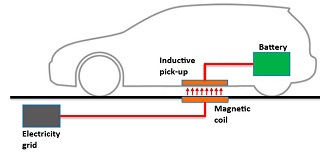EVs and Inductive Charging

My comments:
Once electric transportation gains a major market share, it seems feasible that we’ll trade in some of our battery storage for this charge-while-driving model. Having said that, it’s hard to see this happening on anything but an experimental basis in the next 20 years.
In the meanwhile, inductive charging makes a great deal of sense for buses that travel in predictable routes, e.g., airport hotel vehicles. Considerable work is already underway in this regard.
The actual business model that is ultimately adopted for full scale use, i.e., for passenger cars on highways, is anyone’s guess. The most obvious answer is public/private partnerships, though historically the U.S. hasn’t made this work too effectively.

I would see this very much as a niche product, as Craig says – great for buses and trams on fixed routes. Possibly useful for taxi ranks, and workplace charging without the inconvenience of having to plug in.
This reference (Havo) is a rather surprising venture that seems like more than a copy of (Halo/Qualcomm https://www.qualcomm.com/products/halo ) a company that has been active in this field for years. While I think it is great that more players jump into the field, it is poor practice to name your company in a very similar way to another in the same field that has existed for years. It suggests a type of scam, poor research or intentional theft of a brand. If you are stealing someone’s brand what are you actually offering.
On your other points, Craig, you seem to have a good assessment of the situation. Because roadways are a shared resource cooperation between government and industry would be required. In their fossil fueled quaalude coma some US lawmakers would have no part in this. In the UK however there is a test section of roadway. http://www.highways.gov.uk/knowledge/projects/preparing-the-strategic-road-network-for-electric-vehicles/ South Korea (and other countries) have also had an electric vehicles operating for years based upon inductive technology where they are known as online electric vehicles ( OLEV https://chargedevs.com/features/olev-technologies-dynamic-wireless-inductive-system-charges-vehicles-while-in-motion/ )
A proper name for the high efficiency technology that makes it different from what happens in any transformer would be “magnetic resonance inductive coupling” https://phys.org/news/2012-02-wireless-power-revolutionize-highway.html